The Bible's ancient texts reveal surprising insights on climate stewardship and ecological balance—discover how these lessons apply to modern challenges.
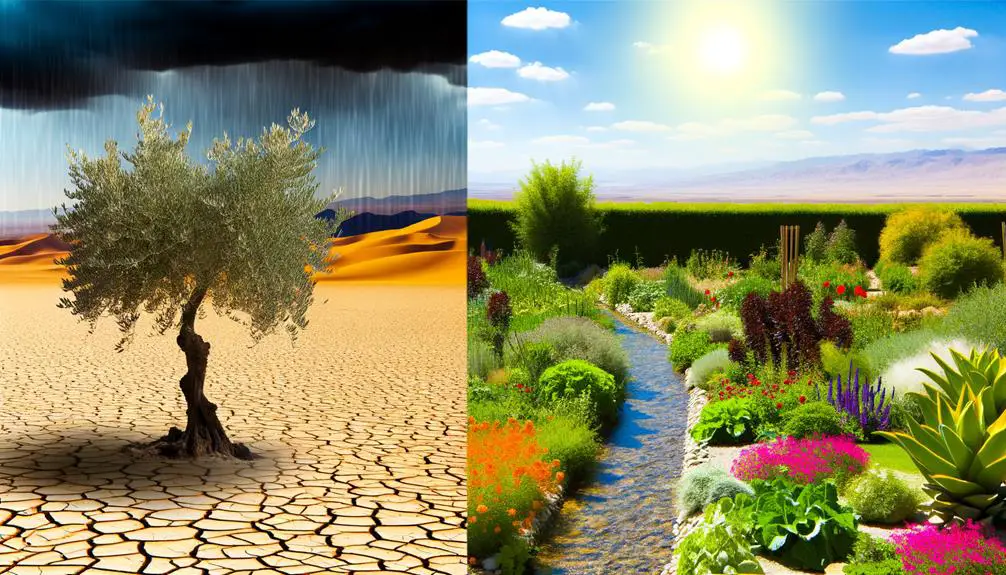
Climate Change in the Bible
In the Bible, you're invited to explore numerous narratives and teachings that emphasize careful stewardship of the earth, hinting at early conceptions of ecological balance and consequences akin to modern-day climate change. Texts like Genesis position humans as caretakers, tasked with preserving nature's harmony. Noah's story illustrates divine judgment through ecological disaster, signaling a reset in our environmental responsibilities. Additionally, lessons from parables and prophetic warnings sharply focus on the moral implications of neglecting this divine mandate. Engaging with these scriptural elements, you'll uncover layers of wisdom on sustainable living that remain relevant in addressing today's ecological challenges.
Key Takeaways
- The Bible does not explicitly mention "climate change" but emphasizes stewardship and care for creation.
- Noah's Flood narrative teaches lessons on divine judgment and environmental stewardship.
- Prophetic books warn of the consequences of environmental neglect and the need for ecological repentance.
- Parables using nature illustrate the importance of balance and reliance on divine providence.
- Revelation connects environmental responsibility with spiritual health and eschatological outcomes.
Biblical Views on Creation Care
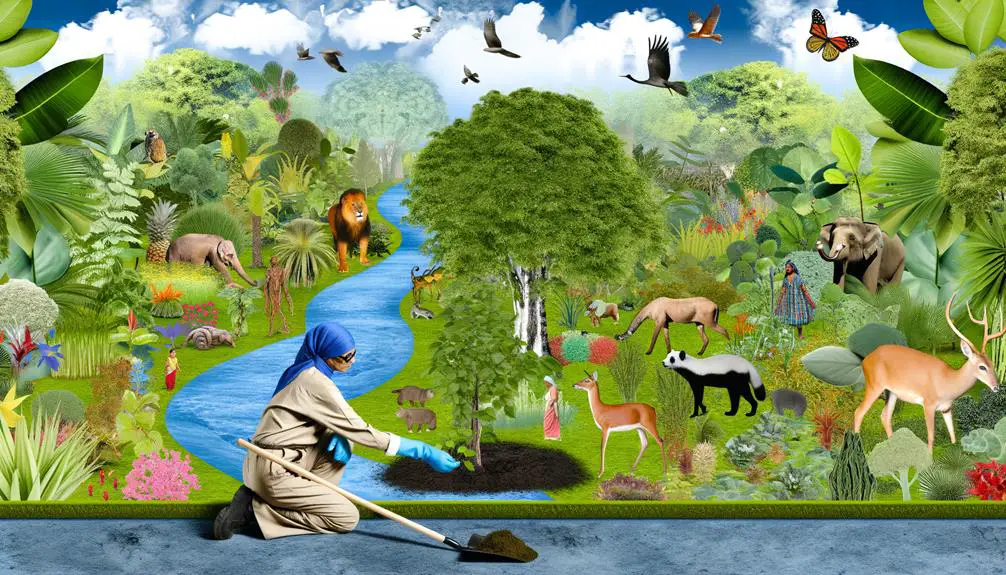
When examining Biblical perspectives on creation care, one must acknowledge that stewardship of the Earth is deeply rooted in scriptural teachings. The Book of Genesis particularly emphasizes this stewardship, presenting the concept of 'Genesis dominion.' This term often misunderstood as a pivotal for exploitative control, is rather a call for responsible caretaking and guardianship. You're tasked with maintaining the health and integrity of creation, reflecting God's own sovereignty and care.
Genesis 1:28 grants humans dominion over the creatures of the Earth, but it's important to interpret this within the context of Genesis 2:15, where humans are placed in the Garden of Eden 'to work it and take care of it.' This implies a symbiotic relationship with nature, not a domineering one. You're called to cultivate and preserve, ensuring the sustainability and flourishing of all life forms.
Moreover, the principle of 'Sabbath rest' offers further insight into Biblical environmental ethics. Every seventh day, a rest from labor is commanded, not just for you but for the land itself (Leviticus 25:4). This regular rest period, a Sabbath for the land, prevents exploitation and promotes ecological balance, highlighting the need for renewal and restraint in your interaction with the environment.
Noah's Flood: Environmental Lessons
As you reflect on Noah's Flood, consider it not only as divine judgment but also as a stark reminder of the need for environmental stewardship. This biblical narrative underscores the consequences of human actions on the earth and points towards the necessity for modern climate resilience. By analyzing this event, you're invited to explore how ancient lessons can inform current responses to environmental challenges.
Flood as Divine Judgment
In examining Noah's Flood, one discerns a profound environmental lesson intertwined with divine judgment, emphasizing the consequences of human actions on earth. This narrative serves not only as a historical account but also as a metaphor for divine retribution through catastrophic symbolism. You see, the deluge wasn't merely about punishment; it was a reset of humanity's stewardship over nature. It reflects on how gravely the divine views the corruption and violence against the creation that was entrusted to humans.
As you ponder this story, consider how it underscores the responsibility bestowed upon you to care for your environment. The flood warns of the severe repercussions of neglect and exploitation, urging a harmonious and respectful interaction with our world.
Modern Climate Resilience
How can we apply the environmental lessons from Noah's Flood to enhance our modern climate resilience? Reflecting on this biblical event, we recognize the importance of preparedness in the face of environmental catastrophes. Noah's foresight in building the ark symbolizes the proactive measures we must undertake. Today, this translates into investing in green technology—innovations that both mitigate our impact on the environment and adapt our infrastructures to withstand climatic extremes.
Implementing resilience strategies is vital. Just as Noah adapted to a world-transforming event, we, too, must develop strategies that enhance our ability to recover from and adjust to climate-related disruptions. This approach not only aligns with divine stewardship but also secures a sustainable future for generations to come.
Parables and Nature
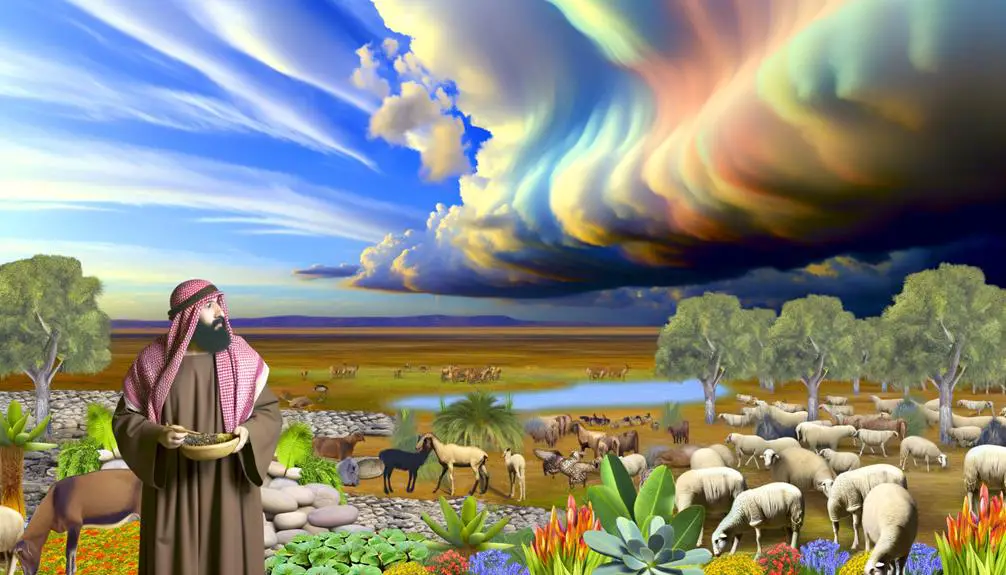
While exploring the parables, it's clear that Jesus often used nature to illustrate complex spiritual truths. Through His teachings, you'll find that nature metaphors and agricultural references abound, providing not only context but also deep insights into the relationship between God's creation and spiritual wisdom. For instance, the Parable of the Sower employs the process of sowing seeds as a metaphor for the dissemination of God's word and the varied reception among different hearts, akin to different types of soil.
This connection between spiritual truths and natural processes isn't just poetic but serves as a reminder of the intrinsic value and wisdom embedded in nature. When Jesus mentions the lilies of the field or the birds of the air, He isn't merely pointing to their beauty or simplicity; rather, He's highlighting a reliance on divine providence that you're called to emulate. These elements don't toil, yet are sustained by God's hand, emphasizing a faith in divine provision that transcends human understanding and effort.
Such lessons from the parables encourage you to view nature as a framework through which divine principles are understood and appreciated, not merely as a resource to be exploited or a backdrop for human activity.
Prophets on Ecological Warnings
Biblical prophets often explored dire warnings about the consequences of environmental neglect and the moral imperative to steward God's creation responsibly. As you investigate the scriptures, you'll find that these prophetic voices weren't just focused on spiritual matters but also deeply concerned with ecological stewardship. They highlighted the interconnectedness of human sin and ecological disaster, urging communities toward ecological repentance.
Take, for example, the prophet Hosea, who lamented over land mourning and animals perishing as a result of Israel's unfaithfulness. This wasn't merely a poetic expression but a stark warning about the tangible outcomes of neglecting covenantal responsibilities towards the environment. Similarly, Isaiah's visions included desolated earth scenarios, not as distant apocalyptic predictions but as imminent consequences of societal greed and mismanagement.
These ancient admonitions resonate with today's environmental crises, suggesting a model of prophetic sustainability. This concept integrates spiritual renewal with sustainable practices, advocating for a balanced relationship with the ecosystem. You're called to reflect on how these prophetic insights can guide current actions and policies, fostering a holistic approach to combating climate change. This alignment with divine will isn't just about conservation but about honoring creation as a sacred trust.
Stewardship of Earth in Psalms
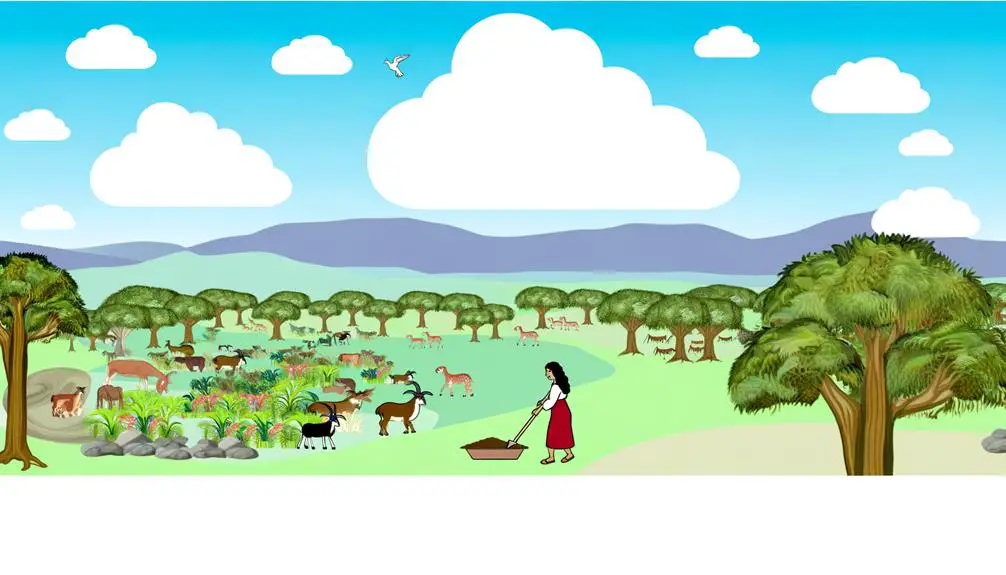
As you explore the Psalms, you'll find that they not only celebrate Earth's beauty but also articulate a divine mandate for its care. These scriptures emphasize that stewardship is not merely an optional duty but a critical responsibility bestowed by the Creator. Understanding Psalms in the context of creation care can deepen your appreciation for the role humanity plays in sustaining the planet.
Earth's Beauty in Psalms
The Book of Psalms frequently celebrates Earth's beauty, urging you to recognize your duty to steward this divine creation responsibly. Through green metaphors and creation praise, the psalms poetically position you as a caretaker of God's artistry. These scriptures are not merely ornamental but serve a profound pedagogical purpose. They teach you to view natural beauty as a reflection of divine glory, which commands respect and careful management.
Psalms on Creation Care
Building on the recognition of Earth's divine beauty in Psalms, you're called to actively engage in its care and preservation. The Psalms, often seen as spiritual poetry, also serve as eco psalms, embedding green commandments within their verses. When you explore Psalms, you find a profound mandate not just to admire but to protect the creation entrusted to humanity. These texts are not merely passive reflections but active calls to stewardship, urging you to respond to environmental degradation with the same zeal as protecting a sacred artifact.
In this stewardship, each action you take resonates with the Psalms' appreciation of nature's awe-inspiring attributes. It's not just an ecological duty but a spiritual service to honor and maintain the integrity of God's creation.
Divine Mandate for Stewardship
In Psalms, you're entrusted with a divine mandate to steward the Earth, a responsibility that transcends mere appreciation to encompass active preservation and care. This divine responsibility calls for a profound commitment to stewardship ethics, which can be understood through several key aspects:
- Recognition of Creation's Value: Acknowledge that the Earth is God's creation and merits respect and care.
- Active Participation: Engage in actions that sustain and restore the natural world.
- Educational Advocacy: Teach others about the importance of environmental stewardship as a moral obligation.
- Sustainable Practices: Implement and promote practices that lead to long-term health of the planet.
Wisdom Literature and Ecology
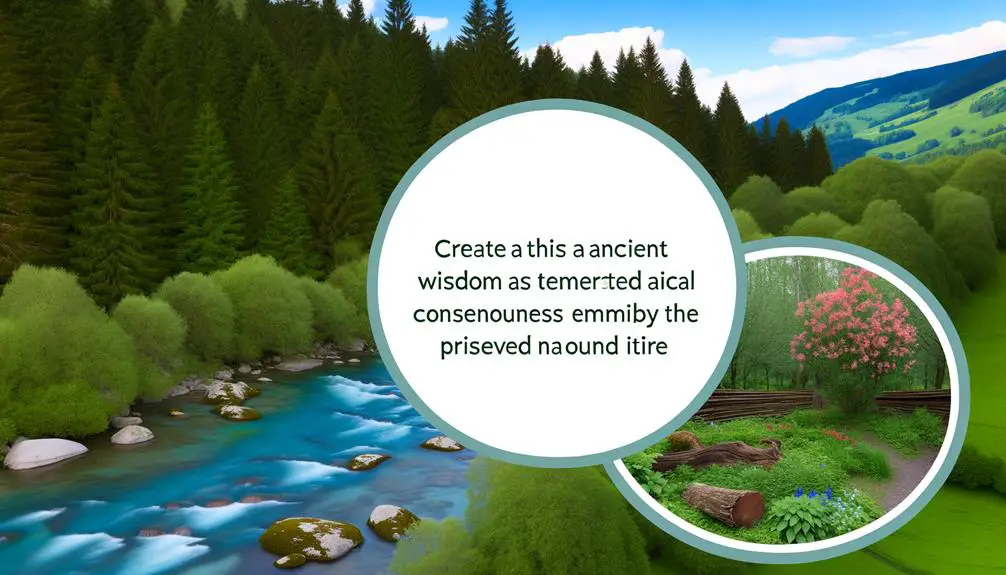
ARTICLE TITLE: Climate Change in the Bible
PREVIOUS SUBTOPIC: 'Divine Mandate for Stewardship'
CURRENT SUBTOPIC: 'Wisdom Literature and Ecology'
One finds that Wisdom literature, interwoven with ecological themes, offers profound insights into how you're called to steward the Earth responsibly. The books of Proverbs, Job, and Ecclesiastes brim with reflections on nature and our place within it. For instance, Ecological proverbs throughout the Bible not only provide practical advice but also underscore a deep-seated reverence for the Creator's work. The imagery in Job particularly—where Job's nature encounters are detailed—reveals the intricate connections between human life and the environment.
These texts challenge you to contemplate your actions and their impacts on the world around you. They call for a balance, promoting a symbiotic relationship between human activity and natural preservation. Here's a clear representation of key ecological insights from Wisdom literature:
Source |
Ecological Insight |
|---|---|
Proverbs |
'The righteous care for the needs of animals' (Proverbs 12:10) |
Job |
'Ask the animals, and they will teach you' (Job 12:7) |
Psalms |
'The earth is the Lord's, and everything in it' (Psalm 24:1) |
Ecclesiastes |
'Who knows if the human spirit rises upward' (Ecclesiastes 3:21) |
Through this lens, you're invited to explore a faith-driven ecological ethic that emphasizes conservation and respect for life. Wisdom literature doesn't just reflect ancient beliefs but actively contributes to contemporary environmental discussions, urging a thoughtful stewardship that honors God's creation.
Jesus and Natural Elements
Reflecting on the wisdom literature's ecological insights, you'll find that Jesus' interactions with natural elements further illuminate the biblical mandate for environmental stewardship. His life and teachings provide profound examples of how divine authority intertwines with care for creation. Here are four key instances where Jesus demonstrates his relationship with the natural world:
- Miraculous Control Over Nature: Jesus' command over the natural elements is vividly displayed when he calms a storm on the Sea of Galilee. This act not only showcases his divine power but also his role as a harmonizer and protector of creation.
- Multiplication of Resources: The feeding of the 5,000, where Jesus multiplies loaves and fishes, illustrates a sustainable use of resources. It teaches that divine providence can provide abundantly within the natural limits.
- Fig Tree Lesson: When Jesus curses the fig tree for not bearing fruit, it serves as a parable about productivity and the consequences of failing to live up to one's potential within God's creation.
- Storm Calming: Again, when calming the sea, Jesus not only protects his disciples but also demonstrates a balance between human fear and the natural world's power. This act can be interpreted as a call to respect and understand the forces of nature.
These examples encourage you to contemplate how spiritual and ecological stewardship can coexist, guiding toward a more sustainable interaction with our environment.
Revelation: End Times Ecology
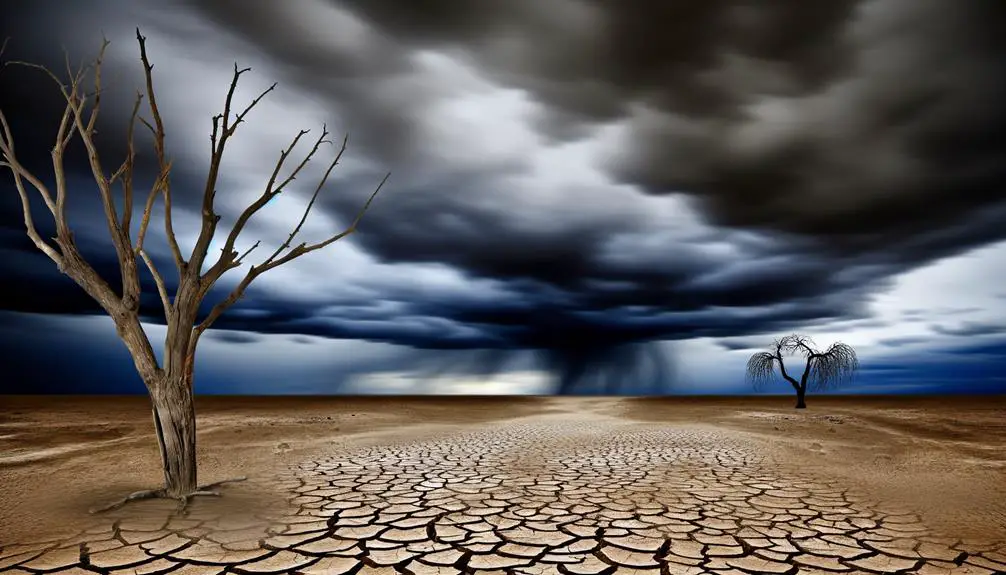
How does the Book of Revelation shape our understanding of environmental responsibility as it relates to the eschatological (end times) narrative? You'll find that Revelation, rich with apocalyptic symbolism, serves not just as a forewarning of the end times but also as a profound call for ecological repentance. This text, often viewed through a lens of cosmic upheaval, vividly portrays the earth suffering under the weight of human sin and neglect.
As you explore further, you'll see that the rivers turning to blood, stars falling from the sky, and the sun scorching the earth aren't merely symbols of divine wrath but are reflective of a disrupted creation groaning for redemption. These images challenge you to contemplate how your actions contribute to environmental degradation and urge a reevaluation of your stewardship over God's creation.
Moreover, Revelation's narrative pushes you to recognize that ecological neglect is a moral issue, intertwined with spiritual health and eschatological promise. The call to repent and restore aligns with a broader biblical command to care for the earth, underscoring that sustainable environmental practices aren't just practical necessities but are imperative to spiritual fidelity and prophetic witness in anticipating the new heavens and new earth.
Applying Biblical Principles Today
In today's world, applying biblical principles to environmental stewardship demands that you critically assess both personal and collective actions in light of scriptural teachings. You're called to be stewards of God's creation, a responsibility that extends beyond personal behavior to include understanding and influencing wider societal and technological implications.
Here are key ways to integrate these principles:
- Reduce Consumption: Scripture promotes simplicity and contentment (1 Timothy 6:6-8). By reducing your consumption, you align with these values, decreasing your environmental footprint.
- Support Sustainable Practices: Engage with and support businesses and policies that prioritize sustainable practices. This includes considering the technological implications of your choices, such as opting for renewable energy sources and supporting technological innovations that lessen environmental impact.
- Advocate for Policy Change: Biblical justice includes caring for the earth (Jeremiah 22:3). Advocate for policies that protect the environment, reflecting your commitment to justice and stewardship.
- Educate and Mobilize Your Community: Use your influence to educate others about the importance of environmental stewardship. Encourage community involvement in initiatives that promote economic adaptations and sustainable living.
Frequently Asked Questions
How Do Different Denominations Interpret Climate Change Biblically?
Exploring through a theological forest, you'll find that different denominations interpret divine stewardship and prophetic signs about climate change uniquely, reflecting diverse biblical understandings and doctrines within their faith-based, analytical frameworks.
Are There Climate Change Skeptics Within Religious Communities?
Yes, within religious communities, you'll find theological dissent and scriptural skepticism about climate change. Many question its validity or interpret scriptures in ways that don't align with mainstream scientific consensus on the issue.
How Have Biblical Climate Interpretations Evolved Over Time?
You'll find that biblical climate interpretations have shifted, blending historical allegories with prophetic interpretations to reflect contemporary environmental concerns, thereby enriching both scholarly discourse and faith-based understanding of stewardship and prophecy.
What Role Do Youth Groups Play in Faith-Based Environmental Activism?
Youth groups are like seedlings, essential in nurturing green initiatives within faith communities. They champion sustainable practices, fostering a proactive stance in environmental activism that's both spiritually and intellectually grounded.
How Do Religious Leaders Influence Public Policy on Climate Change?
Religious leaders leverage their influence at global summits, advocating for ethical mandates in climate policy. You'll see them cite moral obligations to protect creation, shaping public opinion and governmental action on climate change.

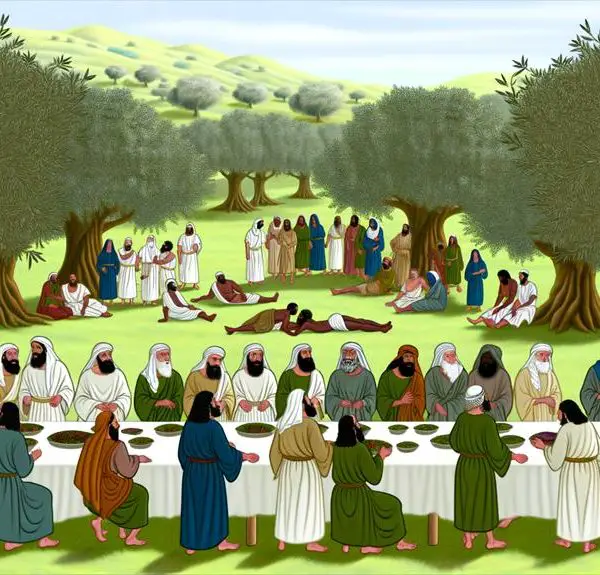
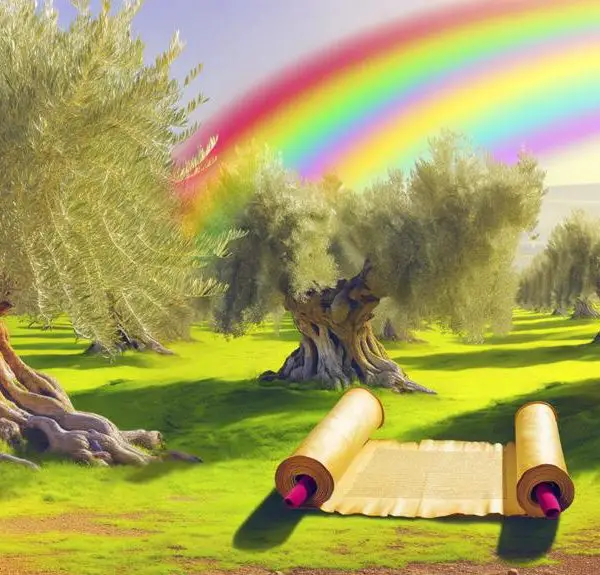
Sign up